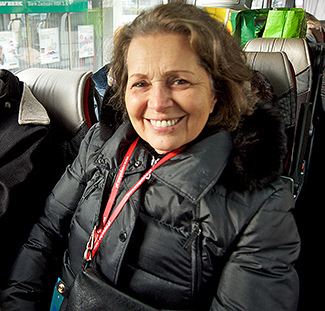
Diane Wohl
Diane Wohl first visited USC Shoah Foundation when it was housed in trailers on the Universal Studios backlot nearly 20 years ago, and her support for its mission and programs has only continued to grow over the years.
Wohl and her husband Howard, through their Diane and Howard Wohl Family Foundation, started out with small gifts to support the Institute’s educational work and also its work in Europe, but throughout their initial three-year commitment, their support just kept growing, Wohl said. They have most recently provided long-term funding for USC Shoah Foundation’s work in France at the new Visual History Archive access site ENS Lyon.
This spring, ENS Lyon will officially launch its Visual History Archive access with a special testimony exhibit.
Wohl said she is proud that USC Shoah Foundation has a presence in France, especially today when anti-Semitism is at a high and knowledge of the Holocaust is particularly crucial. It’s important that all French people, not just Jews, understand the origins of hate and do not accept the rise in intolerance in their country.
“I’m thankful the Shoah Foundation is able to make inroads there. It’s not as easy as it sounds to get the message across,” Wohl said.
Wohl also participated in the Auschwitz: The Past is Present mission trip to Poland for the 70th anniversary of the liberation of Auschwitz. From Jan. 23-28, 2015, Wohl joined other USC Shoah Foundation supporters in Warsaw and Krakow visiting museums and historical sites, learning about the Institute’s work and attending the official commemoration at Auschwitz-Birkenau State Museum. It was her first time back in Poland in seven years, and Wohl said walking in the footsteps of Holocaust survivors and victims “tore her heart.”
Meeting survivors like Dario Gabbai, a former Auschwitz sonderkommando, at the commemoration made the trip incredibly inspiring despite the pain of remembering the Holocaust. Wohl was touched to hear Gabbai talk about his will to survive in spite of the horrible job he was made to do.
“Basically it is almost like getting hit in the chest. It hurts, what went on,” Wohl said. “But it puts a smile on my face to be able to move forward, to never forget but build upon what the future really looks like.”
She was also impressed by the Junior Interns who went to Poland and is excited to see that young people are part of USC Shoah Foundation. They are the future leaders, after all.
“They know a lot more than you think,” Wohl said. “It’s nice to see an organization that respects young minds and sets them off on the right road, makes sure that they’re given the necessary information on both sides [of an issue] to understand why things happen.”
Wohl hopes that testimonies in the Visual History Archive can continue to become more widely available in the future, not just to students but all people, and that others will be inspired by the Institute’s message of remembrance and action against the factors that lead to genocide.
“I want USC Shoah Foundation to consume people’s lives in a way that’s going to be profound,” she said. “No matter who we are, we all have a responsibility to make sure people understand what has happened.”